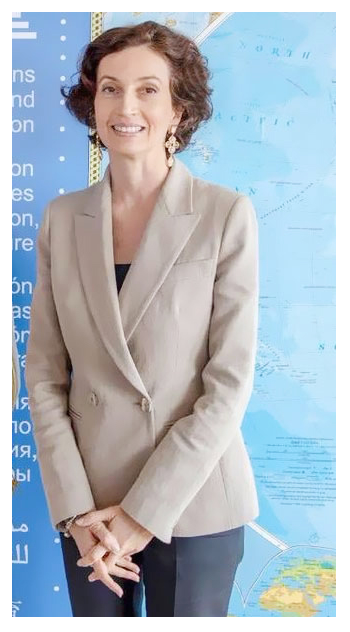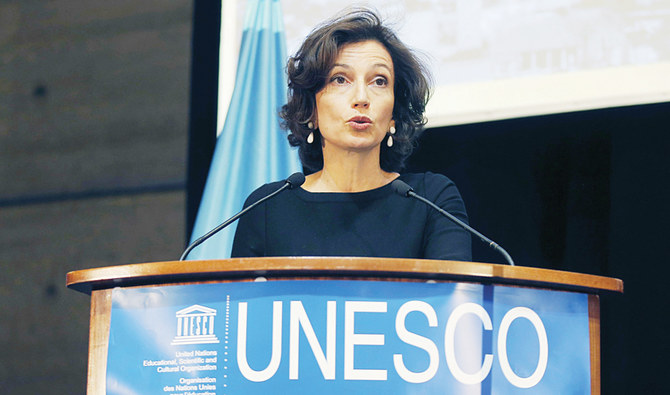PARIS: As the global battle against the coronavirus disease (COVID-19) continues, the precautions introduced in most countries to slow the spread of the disease have affected every aspect of people’s daily lives.
The effect on education has been particularly striking, with many nations indefinitely closing schools, colleges and universities. This has created challenges not only for teachers and students, but also the organizations charged with overseeing and supporting education around the world.
At the forefront of this mission is the UN Educational, Scientific and Cultural Organization (UNESCO). Audrey Azoulay has been UNESCO’s director-general since November 2017. Before that, she was the French minister of culture.
She told Arab News how the organization is responding to the effects of the coronavirus crisis on learning by building a global coalition for education, and also talked about the organization’s other activities in the Middle East and beyond.
“The entire world had to respond to a reality that was unthinkable a few weeks ago: A life without schools,” she said. “More than 1.5 billion school and university students, 90 percent of learners worldwide, are no longer going to school because of COVID-19.
“UNESCO is faced with the challenge of ensuring the continuity of learning as much as possible under these circumstances, while also paying attention to the most vulnerable because inequalities are exacerbated in such situations.”
Azoulay said the organization convened an extraordinary virtual meeting in early March to which the ministers of education from every nation were invited. More than 70 took part and shared the challenges they face and how they are responding.
“It became clear that the need for cooperation, experience sharing and effective support would be great in all regions,” she said. “This is where the idea of a coalition comes from; it brings together actors who do not always work alongside one other. Among them are digital companies, such as Microsoft, Google, Amazon, Huawei and Orange, as well as international institutional partners and media groups such as the BBC.”
Digital technology is key to the continuation of education during the pandemic but it does not help everyone, Azoulay said, given half the world’s population does not have access to the Internet. There are also equality issues even in wealthy countries.
“This is why we encourage countries to combine high-tech, low-tech and no-tech solutions according to the local situation,” she said. “We are working on television and radio programs in Senegal and Gabon, and distributing tablets in Cameroon.”
Education ministers from the Middle East and North Africa played an active role in the meeting, Azoulay said, especially those from Jordan and Egypt.
“We also held discussions with the Saudi authorities, who are currently leading the G20,” she said. “We want to make sure the group takes into full account the educational challenges.” Even before the current crisis, Azoulay was working with Saudi authorities on other issues.
HIGHLIGHTS
• UNESCO is faced with the challenge of ensuring the continuity of learning as much as possible under these circumstances, while also paying attention to the most vulnerable because inequalities are exacerbated in such situations, says Audrey Azoulay.
• The organization arranged an unplanned meeting in early March to which the ministers of education from every nation were invited. More than 70 took part and shared the challenges they face and how they are responding, she says.
“I was invited by the Saudi Minister of Culture, Prince Badr bin Farhan Al-Saud, to visit Saudi Arabia in January on the occasion of the Nobel Prize conference,” she said. “It was held at AlUla’s exceptional venue of Hegra, which is a UNESCO World Heritage Site.
“I also had the opportunity to discuss the issues and the challenges facing the Kingdom’s presidency of the G20 with King Salman and Crown Prince Mohammed bin Salman.”
Azoulay recalled that in November Saudi Arabia was elected to UNESCO’s Executive Council, one of the main governing bodies of the organization, and holds a seat on the World Heritage Committee. She also highlighted the creation of the Saudi Ministry of Culture in June 2018 as a “significant development.”
“Prince Badr, the minister of culture, approached UNESCO for support to the establishment of this new governmental department and identification of its public policies,” she said.
“The second field of action discussed with Prince Badr was heritage and its preservation, particularly in the Arab world. We are working on a broad action plan with the Saudi authorities. It will include the fields of digital technology, sustainable cultural tourism, the safeguarding of traditional construction techniques, the preservation of World Heritage sites, and the promotion of creative economies.”
Azoulay also discussed UNESCO’s other responsibilities with Saudi authorities during her visit, including science, climate change, education and the establishment of a regulatory media environment consistent with international standards.
We signed a cooperation agreement through which we will help organize the (Ministry of Culture) in cooperation with UNESCO’s department of culture,” she said. “We also discussed the preservation of heritage, not only in Saudi Arabia but in the Arab world and the world in general.
“We are currently cooperating on such subjects as digital technologies and heritage. In fact, digital technologies are used at Al-Ula as well as at Mosul in Iraq. This intersection of digital technology and culture is under discussion with a view to strengthen cooperation between Saudi Arabia and UNESCO.
“Saudi Arabia was previously reluctant in terms of granting visas and sharing heritage. I think that culture is an extremely important vector for the opening up of the country, because with culture there comes also scientific, expert and visitor exchanges. At the end of the day, this cannot be anything but beneficial.”
Azoulay is already thinking about the type of global UNESCO initiatives that will be needed post-pandemic.
“We should push for an ambitious public support plan to be put together for the creative sector,” she said. “It has been affected more than ever before by the quarantine and the lockdown, especially the most fragile professions and their traditional craftsmen and artisans.”
Jordan is another country in which UNESCO plays an important supporting role, Azoulay said.
“We witness how essential is the role of investing in sciences and in scientific cooperation and how crucial it is when facing common challenges,” she said. “This has been made clear during the present COVID-19 crisis.
“In Jordan, near Amman, an exceptional research laboratory has been operating for two years. It was established under the patronage of UNESCO and we are proud to support it. It is an excellent scientific facility that uses electricity to produce intense beams of light brighter than the sun. This has allowed research teams to make significant progress in various fields, including medical, biological, archaeological and environmental areas.
“It is an intergovernmental institution that brings together countries (including Iran, Israel, Cyprus and Turkey). It constitutes an example to be followed and I call on the countries of the Arab world to become a part of it if they have not yet done so.”
UNESCO also plays other key cooperative roles in Jordan and beyond, Azoulay said.
“We have also discussed ways to better protect natural heritage,” she added. “We have to increase the number of protected lands and seas in the world. I think that this might be one of the lessons for the post-COVID world. The reason is that scientific studies have shown a link between the loss of biodiversity and the development of zoonoses, which are diseases originating from animals and transmitted to humans, which is what happened with COVID-19.”
Of course, the coronavirus crisis is only the latest threat to culture and tradition in the Middle East. Conflicts in places such as Syria, Jerusalem and Palestine continue to be a major concern.
“Among the 86 World Heritage sites located in Arab states, 20 are currently on the list of endangered World Heritage sites,” said Azoulay.
“The situations in Yemen and Syria is of particular concern to me….Sadly, the conditions for a massive reconstruction operation on the ground have not yet been met. Consequently, we are focusing mostly on technical training and documenting the situation. And, the same way we are implementing our ambitious “Revive the spirit of Mosul” initiative in Iraq, we also stand ready to do more in Yemen and Syria whenever conditions are met.”
















